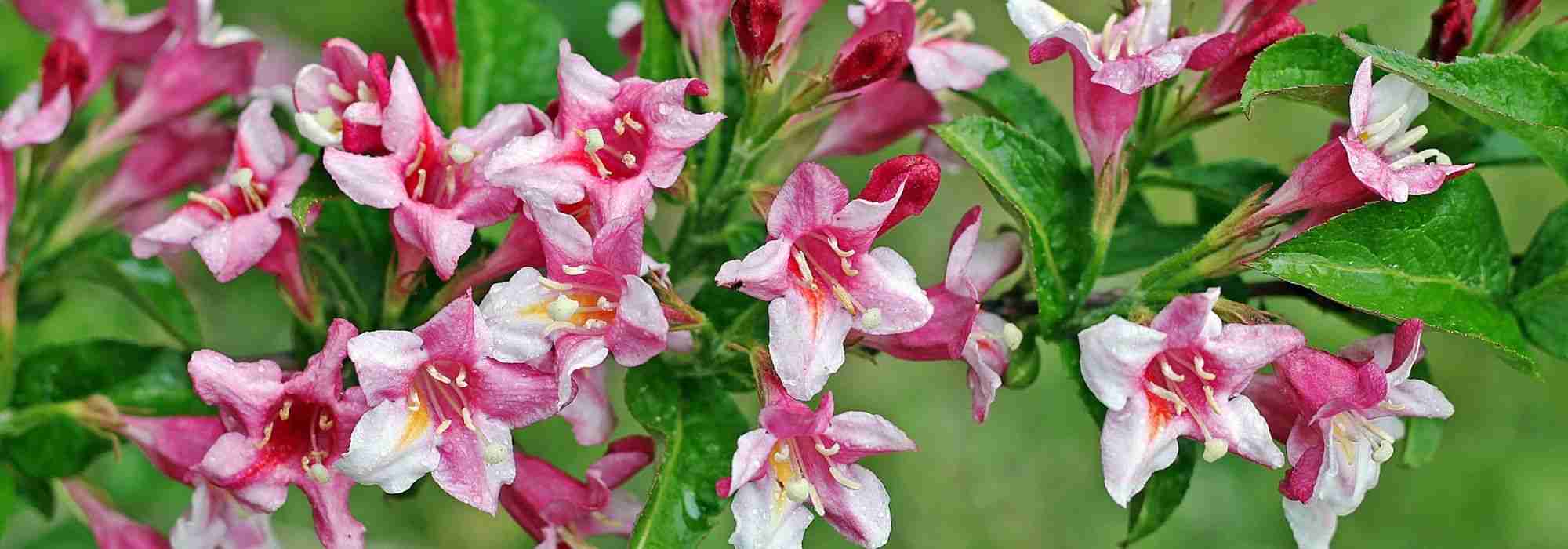
How to choose a Weigela?
Buying guide and criteria for finding the ideal weigela variety
Contents
Weigela is a shrub native to the Far East, particularly prized for its abundant spring flowering.
Easy to grow, it ticks many boxes and adapts to all types of garden : floriferous, vigorous, hardy, not very susceptible to disease, rapid growth, tolerance of lime, low maintenance… Weigela delights both experienced gardeners and beginners.
Among the many varieties, let’s see how to choose a weigela according to flower colour, flowering period, foliage shades, pruning and garden use.
Depending on the colour of its flowers
From May, Weigela is adorned with a multitude of small tubular bell-shaped flowers, about 3 cm. They are grouped in clusters along the branches of the shrub. Weigelas offer a beautiful palette of colours: from white to red, including pink, purple, yellow and even multicoloured flowers, you will surely find a shade you like.
Pink Weigelas
Pink Weigelas are probably most widespread. Pink colour comes in many shades to suit all types of gardens and tastes:
- pastel pink (Weigela florida ‘Rosea’, ‘Pink Poppet’)
- vivid pink (‘Magical Rainbow’, ‘Moulin Rouge Brigela’, ‘Picobella Rosa’)
- purplish pink (‘Alexandra’, ‘Victoria’, ‘Minor Black’)
- pink with apricot tones (‘All Summer Peach’)
White Weigelas
White-flowered Weigelas bring a romantic touch to any garden and set off colours of other plants beautifully.
Among them, we have:
- the small ‘Black and White’, which produces a lovely ivory-white flowering tinged with red at base of the flowers;
- the Weigela florida ‘Ebony and Ivory’, with its pure white trumpets contrasting with its purple foliage;
- ‘Milk and Honey’, a variety with refined white flowers;
- ‘Candida’, which bears large white funnel-shaped flowers with long stamens.
Red Weigelas
To bring a dynamic touch to garden, balcony or terrace, turn to red Weigelas:
- Weigela ‘Nain Rouge Courtanin’, a bright, lively red with pretty white stamens;
- Weigela florida ‘Bristol Ruby’, with funnel-shaped flowers of a crimson red;
- the hybrid Weigela ‘Red Prince’, with large flowers of 4.5 cm in an intense red;
- ‘All Summer Red’, which offers a long flowering period in bright red, contrasted by beautiful white stamens;
- the hybrid Weigela ‘Eva Rathke’, which bears large 6 cm bell-shaped flowers in a deep carmine red.
Yellow Weigelas
Rarer, the Weigela middendorffiana offers pretty pale amber-yellow bell-shaped flowers, with petals speckled with very bright orange shades.
Weigela subsessilis ‘Canary’ in turn bears tubular yellow flowers highlighted by golden stamens.
Purple Weigelas
Weigela florida ‘Monet Verweig’ is a small variety with purplish-pink flowers, set off by magnificent variegated foliage.
Meanwhile, ‘Stelzneri’ carries lovely purple buds opening into pink trumpet flowers, while ‘Wings of Fire’ offers small bell-shaped flowers in a pink tending towards violet.
Weigelas with multicoloured flowers
These Weigelas dress gardens in beautiful colourful, contrasting shades: the Weigela florida ‘Polka’ produces large pastel pink flowers, revealing a dark pink throat and a golden-yellow centre; ‘Purpurea’ offers deep pink bells with a lighter centre and white anthers; ‘Marjorie’ dresses itself in a range of pinks, sailing from palest to deepest.
Finally, ‘Carnaval’, one of most floriferous varieties, offers a magnificent multicoloured flowering ranging from white to pink and to red.

Weigela ‘Carnaval’, Weigela ‘Candida’ (Photo Denolf) and Weigela middendorffiana (Photo Kor!An)
Read also
Weigelia: planting, growing, pruningBy flowering period
Weigelas flower abundantly in spring, around May and June. But some varieties reward us with long, perpetual flowering periods, almost continuous for several months, to our great delight and that of pollinating insects.
This is true of the aptly named Weigela ‘All Summer Red’, the most perpetual of all, which, despite its small size, produces bright red, funnel-shaped flowers almost continuously from April to September. Similarly, ‘All Summer Peach’ displays its pink-salmon tones for nearly six months.
From May to October ‘Picobella Rosa’ is adorned with small bell-shaped flowers, as are ‘Polka’ and ‘Nana Variegata’, very floriferous in late spring, then again in autumn.
For mid-summer flowering, ‘Princess Ayla’ and ‘Stelzneri’ will adorn the garden from June to August.
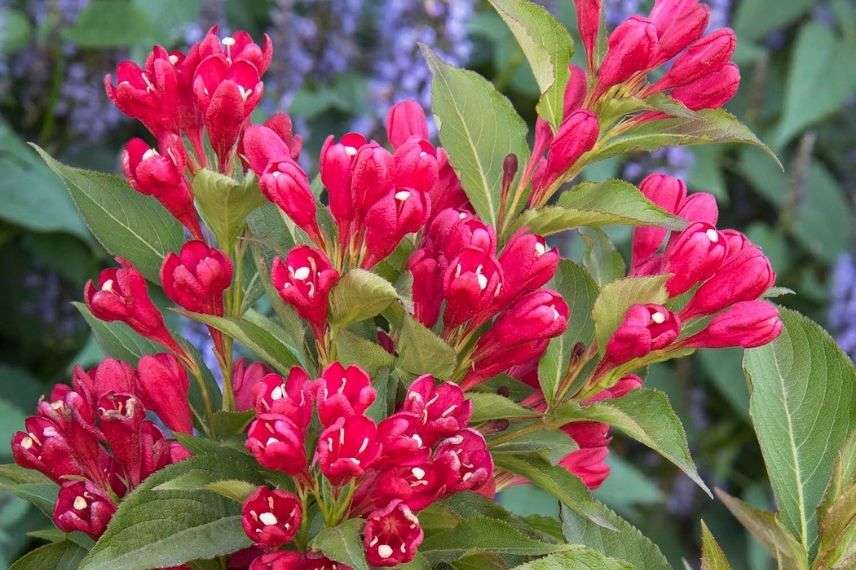
Weigela ‘All Summer Red’
Discover other Weigela
View all →Available in 1 sizes
Available in 2 sizes
Available in 0 sizes
Available in 2 sizes
Available in 0 sizes
Available in 0 sizes
Available in 2 sizes
Available in 2 sizes
Available in 2 sizes
Available in 2 sizes
Varieties with ornamental foliage
Weigelas are shrubs with a loose, bushy habit and usually deciduous foliage of green colour. Some very decorative varieties, however, offer other hues or variegated tones of yellow and purple, sometimes changing over the months.
These distinctive foliage further enhance the aesthetic appeal of this shrub.
- ‘Magical Rainbow’ and ‘Moulin Rouge’ display very bright variegated foliage, in green and golden tones.
- ‘Nana Variegata’ and ‘Kosteriana Variegata’ have dark green foliage with ivory or cream margins.
- ‘Monet Verweig’ offers a striking foliage, first variegated pink and green, before developing cream margins over time.
- ‘Lime Monster’ produces large, bright light-green leaves, slightly curved, reminiscent of giant basil foliage.
- ‘Alexandra’ and ‘Ebony and Ivory’ possess particularly dark foliage, a green tending towards purple, which perfectly highlights their flowering.
- ‘Milk and Honey’ produces leaves variegated green and yellow that turn red and golden in autumn, as does ‘Pink Poppet’, whose green foliage warms to purplish and ochre tones late in the season.
- Finally, handsome ‘Wings of Fire’ lets its colours evolve through the seasons: green, bronze, before moving to orange and blazing red tones in autumn.

Weigela ‘Alexandra’, Weigela ‘Moulin Rouge’ and Weigela ‘Wings of Fire’ (Photos Denolf)
Read also
Pruning spring-flowering bushesDepending on its size and use
Depending on variety, weigela measures between 80 cm and 2.5 metres on average.
Dwarf varieties are perfect for small spaces, while larger varieties can be used in loose hedges or borders. Their different forms will suit every use in the garden.
Small varieties to grow in pots or small gardens
Compact and small in size, dwarf weigela varieties are ideal for growing in pots, as well as in small outdoor spaces.
Dwarf weigela ‘Picobella Rosa’ displays a compact habit (about 40 cm high by 60 cm wide), making it easy to fit into a container, on a terrace or a balcony.
Slightly larger, but still not exceeding 1 metre and therefore still perfect for small spaces, note also ‘Minor Black’ (maximum 60 cm in all directions), ‘Black and White’, ‘Monet Verweig’, ‘All Summer Peach’ and the weigela ‘Nain rouge Courtanin’ (1 metre in all directions).
Larger varieties
Whether planted alone, in a loose hedge or at back of a border, larger weigela varieties are ideal.
This includes the large ‘Bristol Ruby’, ‘Alexandra’, ‘Rosea’ or ‘Candida’, which reach more than 2 metres in height and spread, quickly dressing large spaces.
Of somewhat more modest size and with well-balanced forms, Weigela middendorffiana, ‘Eva Rathke’ and the magnificent Weigela hybrid ‘Carnaval’ (1.5 m in all directions) will sparkle in a flowering border.
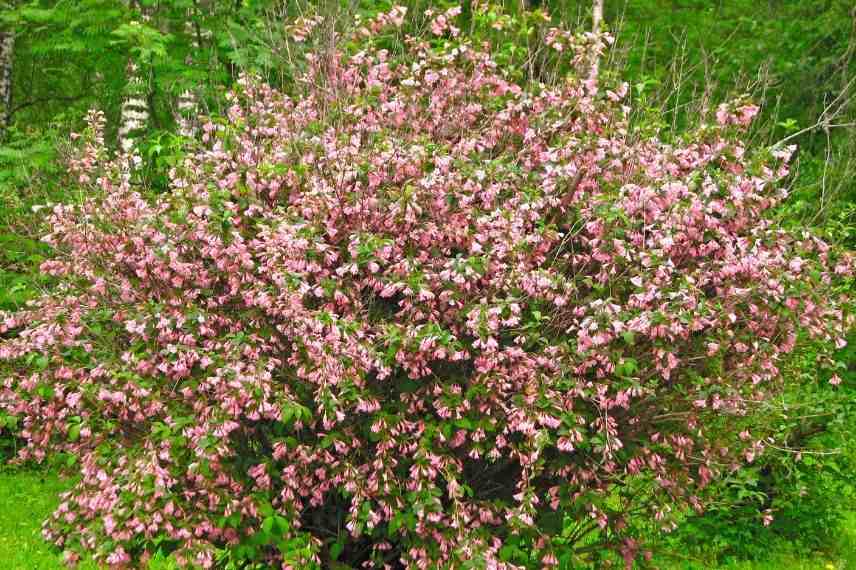
Weigela florida ‘Marjorie’
- Subscribe!
- Contents
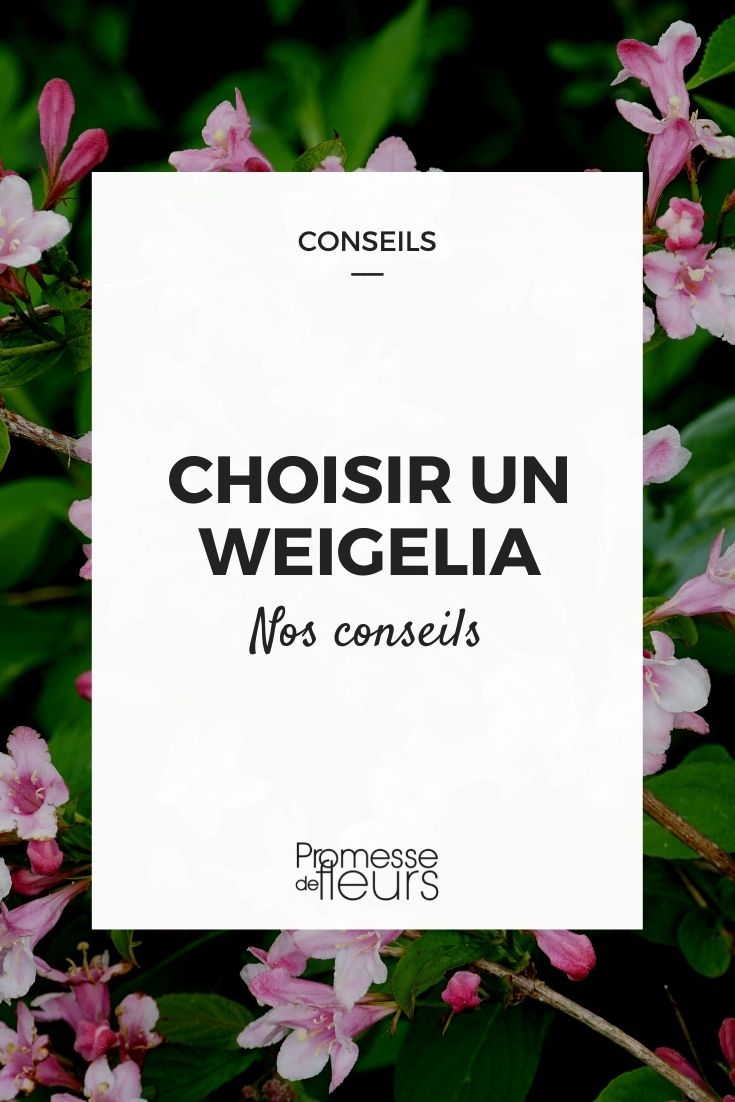






























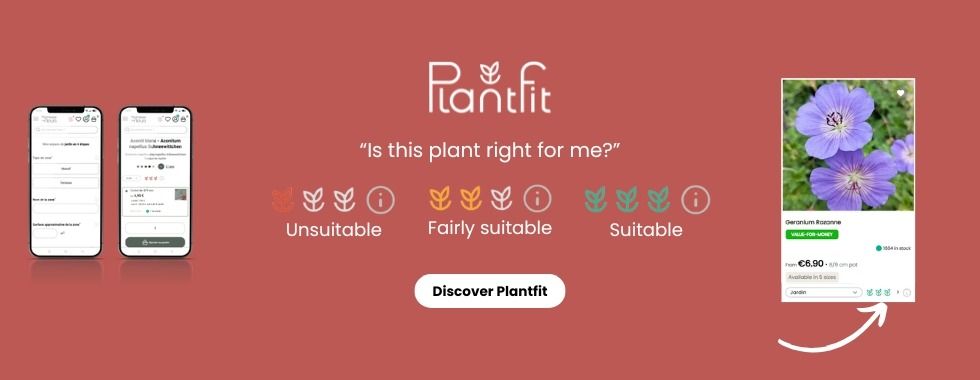
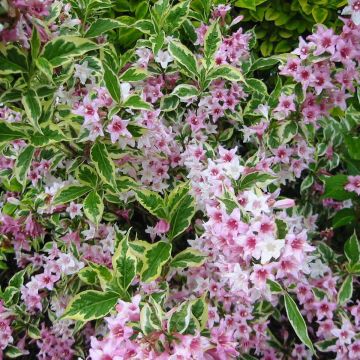
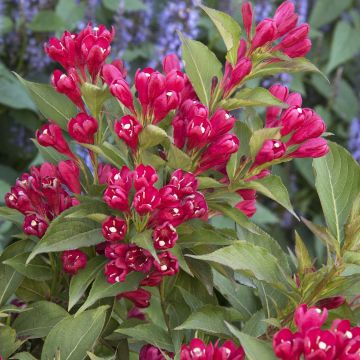
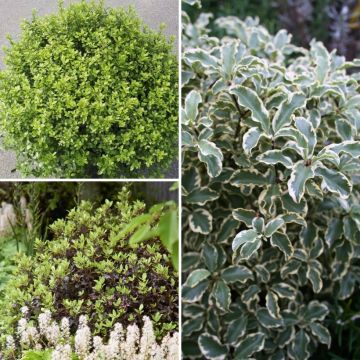
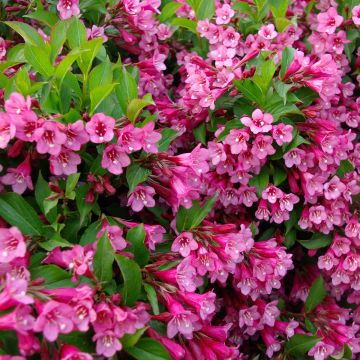
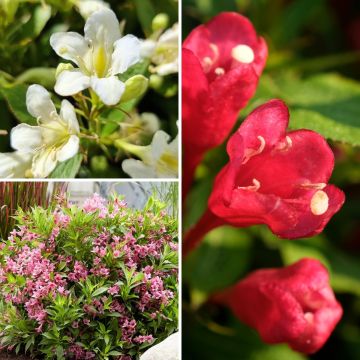
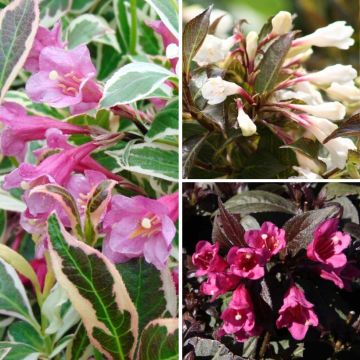
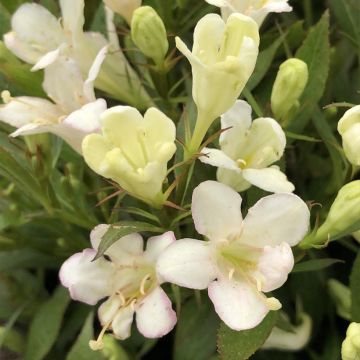
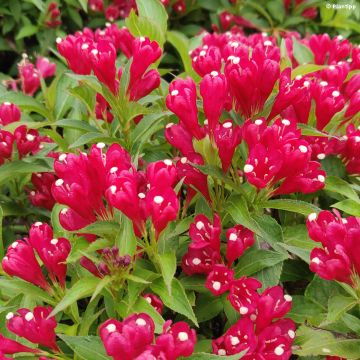
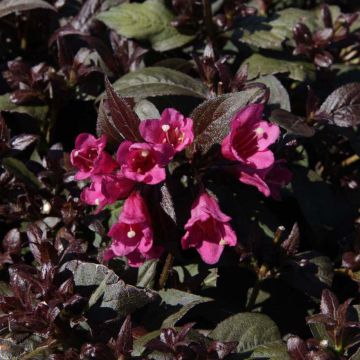
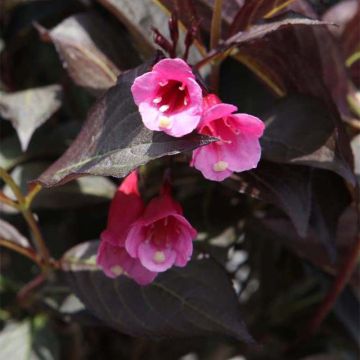
Comments